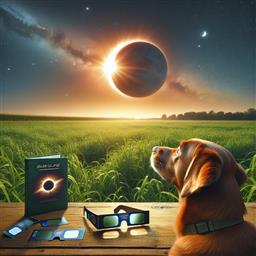Solar Eclipse Dog Names - Page 5
Updated: May 01, 2024
There is something truly magical and captivating about a solar eclipse. This awe-inspiring celestial event, where the moon momentarily obscures the sun, creating a breathtaking sight, has been fascinating humans for centuries. In many cultures, it's believed to be a sign of new beginnings, while others see it as a symbol of power and mystery.
As a dog owner, naming your furry friend after this remarkable phenomenon can be a unique and fitting way to celebrate their personality. After all, each pet is a significant light in our lives, just like the sun. Here, we have compiled a list of names inspired by the solar eclipse. These names will not only reflect your love for astronomical events but also highlight the special bond you share with your canine companion.
Whether you're a stargazer, a science enthusiast, or simply a lover of unique names, this list will surely have something for you. So, embark on this star-studded journey and find the perfect name for your four-legged friend that's as unique and magical as a solar eclipse.
| Name | Reason to Choose |
|---|---|
| Spectral | Reflects the spectral colors visible during a total solar eclipse |
| Spica | Named after the brightest star in the constellation Virgo |
| Star | This name represents the sun, which is a star that gets obscured during a solar eclipse |
| Stella | Stella means 'star', a celestial body that is blocked out during a solar eclipse |
| Stellar | This means 'like a star', apt for a solar eclipse |
| Sundial | A nod to the ancient method of timekeeping using the sun |
| Surya | Surya is the Hindu god of the sun, a perfect tie-in to the solar eclipse theme |
| Syzygy | Astronomical term for when three celestial bodies align, like during an eclipse |
| Terra | Terra is Latin for 'earth', one of the three celestial bodies involved in an eclipse |
| Titan | Titan is a moon of Saturn, tying in the celestial theme |
| Totality | Refers to the phase of an eclipse when it is total |
| Twilight | Refers to the brief period of semi-darkness during an eclipse |
| Umbra | The darkest part of a shadow during an eclipse |
| Uranus | Named after one of the planets in our solar system |
| Vega | Named after one of the brightest stars in the night sky |
| Venus | The brightest planet, often visible during an eclipse |
| Vesper | Vesper means 'evening star', symbolizing the twilight that occurs during a solar eclipse |
| Vortex | Represents the swirling patterns visible in the corona during a solar eclipse |
| Yugen | A Japanese word referring to the profound awareness of the universe which evokes feelings that are inexplicably deep and too mysterious for words - like watching an eclipse |
| Zenith | The point in the sky directly above an observer, where an eclipse may occur |
| Zephyr | Named after the soft wind that often accompanies a solar eclipse |
| Zodiac | Zodiac refers to the path of the sun, moon, and planets - all key players in an eclipse |
|
Suggest:
|
Submitted!
|
| 1 2 3 4 5 | |
Famous Astronomers
| Name | Description |
|---|---|
| Aristarchus | Inspired by Aristarchus of Samos, the ancient Greek astronomer and mathematician who presented the first known heliocentric model of the solar system |
| Brahe | The name is a tribute to Tycho Brahe, known for his accurate and comprehensive astronomical observations |
| Burnell | Inspired by Jocelyn Bell Burnell, a British astrophysicist who discovered the first radio pulsars |
| Cassini | Named after Giovanni Domenico Cassini, an Italian mathematician, astronomer and engineer |
| Copernicus | This name pays homage to Nicolaus Copernicus, who proposed a model of the universe with the Sun at its center |
| Drake | Inspired by Frank Drake, an American astronomer and astrophysicist |
| Einstein | A nod to Albert Einstein, renowned physicist, who developed the theory of relativity |
| Galileo | Named after the Italian astronomer Galileo Galilei who made significant contributions to observational astronomy |
| Halley | The name is a tribute to Edmond Halley, who is best known for computing the orbit of the famous Halley's Comet |
| Hawking | Named after Stephen Hawking, the theoretical physicist and cosmologist |
| Herschel | A nod to Sir William Herschel, the British astronomer who discovered Uranus |
| Hipparchus | This name honors Hipparchus of Nicaea, a Greek astronomer, geographer, and mathematician |
| Hoyle | Named after the British astronomer Fred Hoyle, who is known for the theory of stellar nucleosynthesis |
| Hubble | Edwin Hubble was an American astronomer who played a crucial role in establishing the fields of extragalactic astronomy and observational cosmology |
| Kepler | Johannes Kepler, the German astronomer, is known for his laws of planetary motion |
| Lalande | This name pays homage to Joseph Jerome Le Francais de Lalande, a French astronomer and writer |
| Lalande | This name pays homage to Joseph Jerome Le Francais de Lalande, a French astronomer and writer |
| Laplace | A tribute to Pierre-Simon Laplace, a French scholar whose work was important to the development of engineering, mathematics, statistics, physics, and astronomy |
| Leavitt | This name pays tribute to Henrietta Swan Leavitt, an American astronomer who discovered the relation between the luminosity and the period of Cepheid variable stars |
| Newton | Named after Sir Isaac Newton, who made many contributions to physics and mathematics, including the laws of motion and universal gravitation |
| Ptolemy | This name is in honor of the Greco-Egyptian writer of Alexandria, known as Ptolemy, a mathematician, astronomer, geographer, astrologer, and poet |
| Sagan | A tribute to the American astronomer, Carl Sagan, known for his contributions to the scientific research of extraterrestrial life |
| Thales | Named after Thales of Miletus, a pre-Socratic Greek philosopher and mathematician from Miletus in Asia Minor |
| Tycho | Tycho Brahe, a Danish astronomer, is known for his comprehensive astronomical observations |
| Vera | Named after Vera Rubin, an American astronomer who uncovered the discrepancy between the predicted angular motion of galaxies and the observed motion |
|
Suggest:
|
Submitted!
|
Celestial Bodies
| Name | Description |
|---|---|
| Andromeda | For a dog as majestic as the closest spiral galaxy to the Milky Way |
| Apollo | Named after the god of sun in Greek mythology |
| Astro | Astro means star, perfect for your shining dog |
| Aurora | For a dog that's as beautiful and colorful as the Northern Lights |
| Comet | For a dog that's super fast |
| Cosmo | For a dog that's as fascinating as the universe |
| Eclipse | For a dog that's as rare and fascinating as a solar eclipse |
| Galaxy | For a dog that's out of this world |
| Galileo | For a dog that's as smart and curious as the famous astronomer |
| Halley | Named after Halley's Comet, a celestial body |
| Jupiter | Jupiter is the largest planet in the solar system, suitable for a large breed dog |
| Luna | It's Spanish for moon, which is a significant part of an eclipse |
| Mercury | Fitting for a dog that's as quick as the fastest planet in our solar system |
| Meteor | For a dog that's quick as a shooting star |
| Nebula | Nebulae are stunning clouds of gas in space, fitting for a dog with a colorful personality |
| Nova | A star that suddenly increases in brightness, much like a new pup in your life |
| Orion | After the constellation Orion, which lights up the night sky |
| Pluto | For a dog that's small but mighty, just like the dwarf planet |
| Polaris | The North Star that guides many travelers, much like a dog guiding its owner |
| Pulsar | For a dog with a strong heart and unstoppable energy |
| Saturn | Named after the sixth planet from the sun, for a dog that likes to chill out and take it slow |
| Solstice | For a dog that brings light into your life |
| Starlight | For a dog that's your guiding light |
| Stellar | For a dog that's simply extraordinary |
| Venus | The second planet from the sun, perfect for a dog who’s your number two |
|
Suggest:
|
Submitted!
|
Eclipse Observing Locations
| Name | Description |
|---|---|
| Alliance | Inspired by Alliance, Nebraska, a prime viewing location during the 2017 total solar eclipse |
| Asheville | This North Carolina city was a great spot to view the 2017 solar eclipse |
| Beatrice | A city in Nebraska that was in the path of totality for the 2017 solar eclipse |
| Brevard | This city in North Carolina was a great spot to view the 2017 solar eclipse |
| Carbondale | This town in Illinois is a hotspot for eclipse enthusiasts due to its location |
| Casper | A prime location to view the 2017 solar eclipse in Wyoming |
| Charleston | The last spot within the continental US to view the 2017 eclipse |
| Clayton | This city in Georgia was in the path of the 2017 solar eclipse |
| Columbia | This South Carolina city was a perfect spot to witness the 2017 eclipse |
| Geneva | An homage to Geneva, Nebraska, a prime viewing spot for the 2017 eclipse |
| Glendo | A Wyoming town that was in the path of the 2017 solar eclipse |
| Grand | Inspired by Grand Island, Nebraska, a prime spot for eclipse viewing |
| Hopkinsville | Known as Eclipseville, Kentucky, due to its prime viewing location |
| Idaho | The state offered some of the best viewing spots for the 2017 eclipse |
| Jackson | Inspired by Jackson, Wyoming, a prime viewing location for the 2017 solar eclipse |
| Madras | A city in Oregon that was on the path of totality during the 2017 solar eclipse |
| Murphy | A city in North Carolina that witnessed the 2017 solar eclipse in its totality |
| Nashville | The largest city entirely within the path of the 2017 total solar eclipse |
| Prineville | An Oregon city that was on the path of totality for the 2017 eclipse |
| Rexburg | A city in Idaho that was in the path of totality for the 2017 solar eclipse |
| Rigby | A city in Idaho that witnessed the total solar eclipse in 2017 |
| Salem | A city in Oregon that was directly in the path of the 2017 solar eclipse |
| Sweetwater | This Tennessee city was in the path of totality for the 2017 solar eclipse |
| Tryon | A town in Nebraska that was a prime spot for the 2017 solar eclipse |
| Weiser | Inspired by Weiser, Idaho, a city that was directly in the path of the 2017 solar eclipse |
|
Suggest:
|
Submitted!
|
Astronomy Terms
| Name | Description |
|---|---|
| Apollo | The name of NASA's lunar landing program |
| Aries | One of the constellations of the zodiac |
| Asteroid | A term for a small rocky body orbiting the sun |
| Aurora | Inspired by the natural light display in the Earth's sky, primarily seen in high-latitude regions |
| Comet | An icy body that orbits the sun, named for its glowing appearance |
| Galaxy | Represents the collection of stars and planets in the universe |
| Jupiter | Represents the largest planet in the solar system |
| Leo | One of the constellations of the zodiac |
| Lunar | Refers to anything related to the moon |
| Mercury | Named after the smallest and innermost planet in the Solar System |
| Meteor | A term used to describe a fast-moving piece of space debris |
| Nebula | Refers to a cloud of gas and dust in outer space |
| Neptune | Named after the planet in the Solar System |
| Nova | A star showing a sudden large increase in brightness |
| Orion | Named after a prominent constellation |
| Pluto | The name of the dwarf planet in the solar system |
| Polaris | Named after the North Star |
| Pulsar | A highly magnetized, rotating neutron star |
| Quasar | A term used for extremely luminous active galactic nucleus |
| Sagittarius | Named after one of the constellations of the zodiac |
| Saturn | One of the planets known for its rings |
| Stellar | An adjective related to stars |
| Taurus | Inspired by one of the constellations of the zodiac |
| Ursa | A name inspired by the constellation Ursa Major |
| Venus | Represents the second planet from the sun |
|
Suggest:
|
Submitted!
|
Mythology Inspired Names
| Name | Description |
|---|---|
| Aether | Personification of the upper sky in Greek mythology |
| Apollo | God of the sun in Greek mythology |
| Artemis | Greek goddess of the moon, fitting for an eclipse |
| Atlas | A Titan who held up the sky |
| Aurora | Roman goddess of dawn |
| Cronus | Father of Zeus and a symbol of time like the predictable eclipse |
| Eos | Goddess of the dawn in Greek mythology |
| Hathor | Egyptian goddess who personified the principles of joy, feminine love, and motherhood, also linked with the sky |
| Helios | Another sun god from Greek mythology |
| Horus | Egyptian god of the sky |
| Hyperion | A Titan who fathered the sun, moon, and dawn in Greek mythology |
| Khepri | Egyptian god of creation, movement of the Sun, and rebirth |
| Luna | Roman goddess of the moon |
| Nyx | Greek goddess of the night |
| Osiris | Egyptian god associated with the cycle of the sun |
| Phoebe | Titan associated with the moon |
| Ra | Sun god in ancient Egyptian religion |
| Ravi | Hindu sun god |
| Rhea | Mother of the gods and goddess of nature in Greek mythology |
| Selene | Greek goddess known for driving the moon across the sky |
| Sol | Latin for sun |
| Surya | Another Hindu sun god |
| Thoth | Egyptian god of the moon |
| Titan | The Titans were associated with the primal concepts drawn from the world, such as the sun |
| Uranus | God of the heavens in Greek mythology |
|
Suggest:
|
Submitted!
|
User Submitted Images
There are currently no user submitted images for this page. This is your opportunity to be the first! Submit your photo below.
User Recommendations
There are currently no name recommendations for this page. This is your opportunity to be the first! Make your recommendation below.
Recently Updated
We would like to take this time to thank all of our visitors that make DogNamed.com the best dog naming resource on the web. Our site would not be where it is today without your suggestions, ratings, and photo submissions. So pat yourselves on the back for a job well done and keep up the good work! If you have any comments, suggestions, or ideas for the this page or any part of our site, don't hesitate to drop us a line on our Contact Page. Thank you! -The DogNamed Team




























